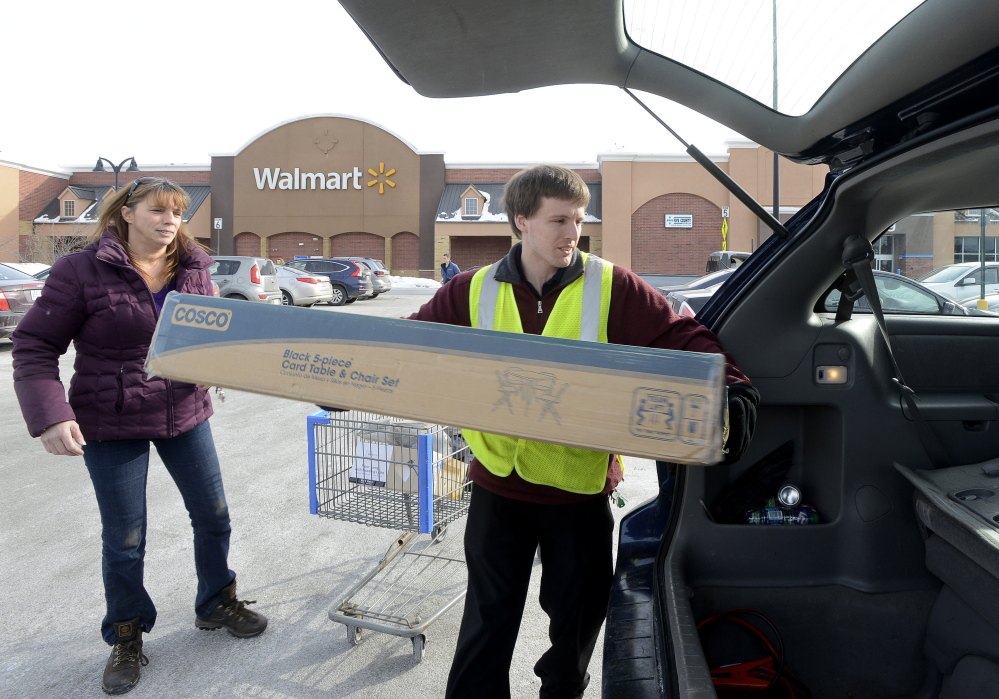For years, Wal-Mart has dominated the retail marketplace with huge stores and low prices.
Now it’s likely to repeat that dominance among the retail workforce with a new nationwide policy that says by April, no employee will earn less than $9 an hour, 20 percent above Maine’s minimum wage of $7.50 an hour. Pay will be boosted again — to at least $10 an hour — in early 2016.
The company announced the new policy this month, confounding critics who have protested its pay and benefits policies. In addition to the higher pay, the company in recent years has liberalized its health care coverage, and now more than half of its workforce, more than 1.2 million Wal-Mart workers, including part-timers who work 30 hours a week or more, have company-subsidized health insurance.
Curtis Picard, the executive director of the Retail Association of Maine, said the move is designed to burnish the company’s image, but it also reflects an economy that is picking up steam after years of a sluggish recovery from the recession of 2008-09.
“We’re in a much better place than we were five or six years ago, and there is competition out there for workers, too,” he said. Wal-Mart’s new pay policy, he said, should ensure that the company gets plenty of applications for openings.
Picard said retail jobs are critical to the economy, with many offering flexible schedules for parents with young children, and are a key source of holiday jobs and starter jobs for teens.
Along with lower gasoline prices, raising the pay of thousands of workers should provide a boost to the state economy, he said.
The recovery finally has picked up steam in terms of hiring, economists have noted, but pay — particularly for low- and moderate-income earners — hasn’t been rising. Normally, this far into a recovery, wages would be rising at a healthy clip as unemployment falls.
Wal-Mart’s boost, given the size of its workforce — more than 6,700 in Maine alone, making it the state’s second-largest employer — might ripple through the retail market because other companies will have to raise their wages to attract or keep employees after Wal-Mart no longer sets a low floor for earnings.
Of Maine’s nearly 600,000 workers, about 20,000 earn the minimum wage, according to the Maine Department of Labor.
Wal-Mart has 25 stores in Maine, including three Sam’s Clubs, which also are covered by the new pay policy. The company said the average pay for its Maine workers is $13.50 an hour for full-time hourly employees.
Kory Lundberg, a Wal-Mart spokesman, said the higher pay will help more than just the lowest wage-earners in the stores. He said the increase on the bottom end will require the company to adjust its pay bands, or compensation ranges, for many jobs. The result will be that half of the company’s 1 million hourly wage-earners will get pay hikes in the first half of this year, Lundberg said.
The company is still sorting out the new policy at the Wal-Mart in Scarborough, but even employees who aren’t sure their paychecks will be getting bigger are applauding the company’s decision.
Stacy Burrell, who has been at the store for 18 years, wasn’t sure whether she’ll get a raise, but she expects that her pay band will be adjusted. Because she’s at the top end of her pay band, she said, her pay probably will go up. But she said that even if it doesn’t, she’s happy for co-workers who will get a raise.
“I have a hard time talking about it and not getting emotional,” she said, noting that many employees who get minimum wage have been working outside during the harsh winter.
She’s also happy about an effort by the company to set up career paths for employees potentially to work as salaried store managers instead of for hourly pay, but said she thinks the company does a good job of recognizing workers who perform well and promoting them.
Tom Bailey, a Wal-Mart trainer, said it’s been fun to tell new employees that they’ll be paid at least $9 an hour in a little over a month, but he also pointed out that few jobs at the stores pay minimum wage — stockers, who are in charge of corralling shopping carts in the parking lot; the greeters at the front of the store; and daytime maintenance people, who are responsible for cleaning up spills and some maintenance work.
Bailey said few of those employees stay in those jobs long before they get more training and start working as cashiers or in other positions.
Sue Mondor, the manager of the lawn and garden department, said the pay raise will boost morale at the store “and it will get people to stay longer.”
“I think this is a wonderful place to work,” said Mondor, of Scarborough, who has been at the store for 12 years.
Greg Dugal, the president and chief executive officer of the Maine Innkeepers Association, said Wal-Mart’s move might increase competition for workers, but he said that’s the way the free-market economy is designed to function.
Dugal spoke against a proposal for the city of Portland to set a minimum wage of $9.50 an hour, which is pending before a City Council committee. Bangor city officials also are considering a proposal to raise wages in that city to $9.75 a hour by 2018.
Dugal opposes efforts to set minimum wages in particular cities, saying he prefers any “reasonable” hike to be done at the state or federal level. He said a company is certainly within its rights to raise pay for its employees.
He also said it’s unlikely to make it too difficult for Portland restaurants and hotels to find workers at current pay levels.
“Most people in the city of Portland who work in our industry are already making $9 or $10 an hour,” Dugal said.
Steve DiMillo, who runs DiMillo’s Restaurant on the Portland waterfront, said many of his workers make twice that amount with waiters and waitresses making as much as $28 an hour with tips. He said he has no problem with a minimum wage increase except for “tip wages” — those servers make $3.75 an hour, but earn much more because of tips.
DiMillo said the only employees who might be tempted to consider working at Wal-Mart for higher wages are beginning dishwashers, who typically make $8.50 a hour at his restaurant. But he doesn’t think many employees would choose to work near the Maine Mall if they have a chance to work on the Portland waterfront for comparable pay.
“I don’t have a Wal-Mart (competing for workers) in downtown Portland,” he said.
Send questions/comments to the editors.





Comments are no longer available on this story